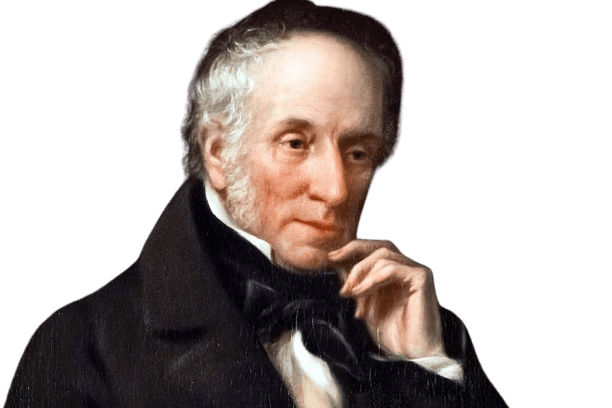Life and achievements
Early life
William Wordsworth was born on April 7, 1770, in the small town of Cockermouth, in the county of Cumberland in England. The second of five children, he spent much of his childhood defined by his mother’s death at the age of eight. This first tragedy affected his emotional and psychological growth, as seen in most poetry.
Brought up by his father, an attorney of James Lowther, Wordsworth was sent to read many books. His father’s library exposed him to Milton, Shakespeare, and Spenser, which made him develop an interest in literature. His education was then transferred to Hawkshead Grammar School, where he nurtured his poetic skills.
Wordsworth entered St. John’s College, Cambridge, in 1787. While at Cambridge, he spent his holidays on walking tours, where he saw natural scenery that he would later incorporate into his poems. In 1790, he went on a walking tour of Europe, France, Switzerland, and Italy, which enhanced his love for nature.
Wordsworth’s time in revolutionary France in 1791 was a critical period in the poet’s life. The Republican movement captured him, and he was also in love with Annette Vallon and even fathered a child named Caroline. However, financial constraints and political rivalry made him return to England while Annette and Caroline were still in France.
Once he returned to England, Wordsworth started to work on becoming a poet. His first poems, An Evening Walk and Descriptive Sketches, were published in 1793. An inheritance from a friend in 1795 allowed him to devote himself to poetry. This period also signified the start of his friendship with Samuel Taylor Coleridge, and together, they produced “Lyrical Ballads.”
Legacy
William Wordsworth is one of the most famous poets in the history of poetry, and his work continues to be celebrated. He focused on nature, emotion, and the individual’s relationship with nature, which changed the course of English literature and paved the way for Romanticism. Wordsworth is one of the most prominent poets whose work is characterized by beautiful language and emotional and philosophical aspects.
Wordsworth’s most significant contribution to literature can be considered the theory of poetry he presented in the preface to the second edition of “Lyrical Ballads,” where he proposed a new approach to poetry that would use the language of ordinary people and represent everyday life. This approach appealed to the readers and inspired many poets and writers.
Wordsworth was clearly a nature lover, and his love for nature is well illustrated in his poems. He regarded nature as a source of spiritual rejuvenation and creativity, a topic that was quite popular among readers. His poems like “I Wandered Lonely as a Cloud” and “Tintern Abbey” describe the beauty of nature and its role in the life of the human spirit.
Wordsworth was the Poet Laureate from 1843 to 1850, meaning he was a poet and an influential figure. Although he did not write much in this capacity, his appointment marked the acknowledgment of his works in English literature. His work was still admired, and his home in the Lake District became a shrine for admirers.
It is possible to observe the influence of Wordsworth on literature in the works of the generations of poets and writers that followed him. His focus on the individual’s feelings, past experiences, and the environment paved the way for the Romantic and subsequent literary eras. To this day, his poetry is considered a reference point for anyone who wants to comprehend the connection between man and the environment.
Thus, William Wordsworth’s contribution to the development of poetry is defined by his new approach to the genre, his focus on nature, and his impact on the further development of English literature. His creations remain relevant and touching, and people still read them, which proves that he is one of the greatest poets in the history of literature.
Milestone moments
Apr 21, 1770
Birth of William Wordsworth
William Wordsworth was born on April 7, 1770, in Cockermouth in Cumberland, England.
He was the second of five children in his family and was born in the Lake District, which became the setting of many of his poems.
His childhood was rather tragic, and he lost his mother at the age of eight, which is a severe trauma for anybody’s psychological and emotional development.
Wordsworth was orphaned at a young age and was raised by his father, who taught him to read and memorize poems.
Jul 18, 1798
Publication of “Lyrical Ballads”
Wordsworth and Coleridge issued Lyrical Ballads in 1798, which was considered the start of Romanticism in English literature.
The selection comprised some of Wordsworth’s most famous poems, such as Tintern Abbey, and focused on using colloquial language and examining the mundane.
The appearance of ‘Lyrical Ballads’ was a landmark in the history of literature; Wordsworth emerged as one of the greatest poets of the Romantic age.
Feb 21, 1805
Completion of “The Prelude”
Wordsworth finished his most prolonged and significant poetic work, “The Prelude,” in 1805.
It depicts the growth of the poet and his interactions with the natural environment.
Although Wordsworth wrote The Prelude in 1805, this poem was not published until after he died in 1850 when his wife Mary arranged for its publication.
The poem is famous for its contemplative and metaphysical meaning, which reveals much about the poet’s personality and approach to writing.
Dec 21, 1843
Appointment as Poet Laureate
In 1843, Wordsworth was appointed the Poet Laureate of the United Kingdom, a position he held until he died in 1850.
He was appointed because of his tremendous contribution to English literature.
Nevertheless, Wordsworth produced less than the Poet Laureate and instead concentrated on his previous and current works and private life.
This appointment as the Poet Laureate cemented him as one of the most prominent poets of his generation.
